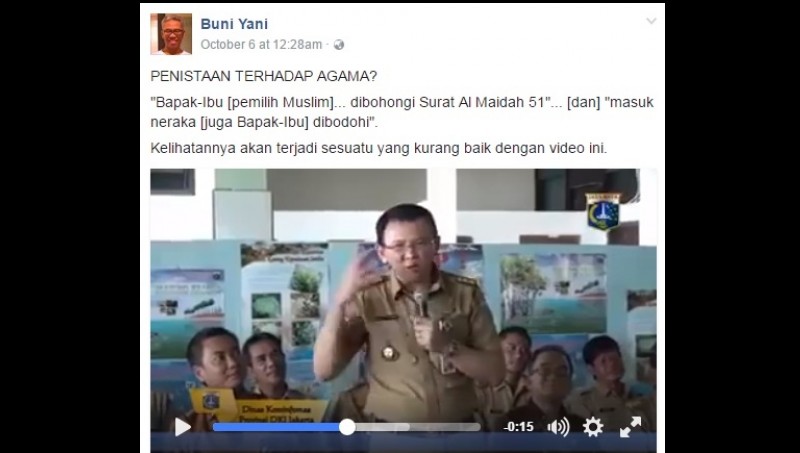Yesterday saw the surprising news that former Jakarta Governor Basuki “Ahok” Tjahaja Purnama had filed for a judicial review (PK) of his controversial blasphemy conviction. There has been a great deal of speculation as to why Ahok and his lawyers would choose to file a PK now, consider he is already almost half-way through his 2-year sentence and that he had chosen not to file an appeal previously.
But since then there have been additional reports giving hints as to the motivation behind the PK, indicating that it is based on an “error” made by the judges.
“He filed for a judicial review because there was an error by the judge, that is in Article 263 of the Criminal Procedure Code (KUHAP). There is a real mistake,” Jootje Sampaleng, spokesperson for the North Jakarta District Court, said yesterday as quoted by Detik.
Article 263 of the KUHAP outlines the accepted reasons for a judicial review, which includes errors by judges as well as new exonerating evidence. The PK filed by Ahok was submitted to the North Jakarta District Court (the same court in which he received his blasphemy conviction).
Jootje said the judge’s mistake referred to by Ahok’s lawyers relates to the verdict in the case of Buni Yani, the man who uploaded an edited version of the former Jakarta governor’s speech in the Thousand Islands (that contained the alleged blasphemy).
Buni Yani was tried, found guilty and sentenced to 1.5 years under the Law on Electronic Transactions and Information (UU ITE) for spreading the viral clip of Ahok’s speech, which the judges in his case said “incited hatred among groups of peoples”.
Although police and lawyers for the government have tried to explain the seemingly blatant contradiction of prosecuting Ahok for blasphemy contained in the video clip and Buni Yani for spreading the clip by arguing they were legally distinct crimes, it seems that this logical inconsistency is the basis of Ahok’s PK .
“He (Ahok) took reference from Buni Yani’s verdict, he compared it to his and came to that decision. The reason is up to him. He believes that there was a real fallacy, a mutual disagreement between the facts and the conclusions of the judges in (Buni Yani’s case and his own),” Jootje said.
Considering Buni Yani’s conviction happened in November, it still seems quite odd that Ahok’s legal team would have only filed the PK recently.
At any rate, the North Jakarta District Court, where the appeal trial is going to be held, said that the first hearing has been scheduled for Feb. 26 so we will get the full details on the PK’s argument then if not before.
In September 2016, Ahok was reported to the police for blasphemy after Buni Yani uploaded a clip from a speech Ahok gave in Jakarta’s Pulau Seribu district in which he told the audience that his political opponents used a contentious interpretation of a Quranic verse to convince people not to vote for non-Muslim public officials. Ahok was sentenced to two years in prison after being found guilty of blasphemy against Islam by the North Jakarta District Court on May 9, 2017.




